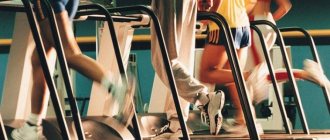Only for short accelerations
Oleg Babchin, founder and senior coach of the Second Wind school:
Running with weights can only be performed to develop speed and strength capabilities. Such exercises are performed with maximum power and in a very short time. In essence, these are accelerations of no more than 100 meters. Running long distances with weights will bring nothing but injury. Biomechanics break down, the load on the musculoskeletal system increases significantly, the emphasis shifts from sharpness and ease of movement to pulling force, which contradicts the laws of economical running.
How to run correctly
Weights allow you to maximally load the spine, joints and the entire body during training. However, in order to prevent benefit from turning into harm, it is necessary to follow important rules:
- The load should increase gradually. Don't try to complete an impossible task. It is better to listen to your body and physical condition.
- Any workout must begin with a warm-up, which should contain flexibility exercises in the form of squats, swinging movements of the legs and arms, various lunges, and bends. Proper gymnastics should help warm up the joints of the whole body, not just the legs. Warming up will prevent joint problems.
- At first, you can train with weights that are designed simply for walking. This will determine how ready the body is for serious stress.
Running with weights – no, general physical training – yes
Alena Dyatlova, leader and coach of the Time4run running club:
Running with weights is a definite no! I am categorically against running with weights and dumbbells. Running itself puts a fair amount of impact on our bodies, and as recreational runners, it's best for us to think about how to reduce it rather than increase it. The fact is that many of us do not follow the regime of professional athletes and, despite good general physical shape, probably have a couple of kilograms of excess weight. That is, we are already carrying dumbbells and weights! Therefore, I would not recommend loading yourself with additional weight while running. And what I would do with cuffs and dumbbells is general physical training.
Having previously worked out all the complexes with your own weight well, you can add weighting. Lunges, walks, jumps, and weighted squats will make you stronger and faster. And doing balance exercises with a small load will help you resist any severe fatigue, from which your technique breaks down while running, and it seems that you no longer have the strength to run.
I would also recommend static and dynamic exercises with resistance, i.e. using various elastic bands and harnesses: this can be running in place or running in a harness. Well, if you suddenly decide to prepare for a short sprint, then you can run with a parachute and with a tire on the back. But that's a completely different story!
Who doesn't need weight training?
Firstly, for beginners. By putting additional weight on a fragile body, a novice athlete risks damaging his back or knees, and at the same time ruining his running technique, which is not yet properly established.
Secondly, running with weights is contraindicated for people with cardiovascular diseases, as well as injuries to the knee joints and spine.
Thirdly, for those who want to lose excess weight. If the percentage of fat is small, then weights, of course, will help you gain a clearer definition. But if we are talking about ten kilograms, the torment will be in vain.
Weights negatively affect running technique
Sergey Sorokin, co-founder and head coach of the Jaxtor marathon club:
Regarding weights for running, it is important to understand why? I have experience experimenting with weights. When I took them off and ran without them, my legs felt especially light. But she quickly disappeared. If your legs suddenly feel heavy at a competition, many people think that weights will help. The problem is that they will not help, and the reasons for the severity are different:
Training plans for marathon and half marathon. and start preparing today.
- lactic acid accumulated in the muscles (if the speed is high);
- running on fats (when glycogen runs out and the body suddenly switches to fats);
- fatigue of the central nervous system.
Weights negatively affect running technique, because... introduce an imbalance into the biomechanics of movement. Hill running is much more effective for strengthening your legs. At Jaxtor we spend several months training on the hills during the summer. Weights are cool for Instagram photos and for adding variety to your workout, but their effectiveness for running is questionable.
How to choose the weight of weights and what are the rules?
When choosing weights, you need to pay attention to the following points:
- Fabric and its quality. Thin jerseys are better than canvas ones,
- Design. As already mentioned, there are plate and bulk products. Bulk ones are cheaper, but their weight cannot be adjusted, and when wiping the fabric, the contents may spill out.
- Individual indicator. There is no need to take more weight than you can realistically handle. Too much weight can impair the technique of performing exercises, which means the effectiveness of training will decrease.
- The weight of the weights must be changed periodically. This must be done both in the direction of increase and in the direction of decrease. Getting used to a certain weight entails a decrease in the effectiveness of training.
- Buy cuts in several weight categories. This will make it easier for you to change weight.
- Do not use weights that weigh more than 5 kg. When working with heavy weights, you will have to slow down.
Thoughtless use of weights can be harmful to health, so you need to follow the rules of running with a load:
- Be sure to do a warm-up. If you immediately put a large load on unwarmed muscles, the risk of injury increases to 80%.
- Increase weight gradually. It is better to start with 300 grams for each leg, or 2-3 kg of vest.
- Start your workout by walking with weights. You need to warm up before running with weights longer than before running.
- Listen carefully to your own feelings. If your breathing becomes faster, tachycardia or discomfort in muscles and joints appears, the load should be reduced immediately.
- Follow proper running technique. This is the key to the health of your joints.
- Do not use weights a week before the race. This is an exercise for the off-season, otherwise if you are injured, you risk not having time to recover.
- Don't run with weights all the time. 1-2 workouts per week is enough. On other days, practice regular running and do endurance exercises.
- Wear knee pads and elastic bandages. This way you can protect your joints from injury.
- Buy special sneakers with good shock-absorbing soles. Thin shoe soles are not recommended for regular running, let alone running with weights.
Running weights will make your workouts more effective. Today, every runner has the opportunity to find the best weighting option for themselves, based on their individual needs. But before you practice running with weights, it is better to consult with a specialist and make sure there are no contraindications . Only a qualified trainer can create a competent running program and select the optimal weight of weights.
Why are leg weights needed and for what workouts?
Despite the obvious benefits, weights are not suitable for any form of exercise. ACT notes that they are effective for active activities such as walking, aerobics and step aerobics. And you shouldn't use weights for more vigorous workouts like running. Using weights will change your workout rhythm, which is not a good thing. You may, for example, move your arms more vigorously, which will ultimately lead to injury due to the added stress on your muscles, ligaments and joints.
Weights perform well during strength training with your own weight, such as leg swings, lunges, squats and other exercises that involve repeated low-intensity movements of certain parts of the body. With the help of weights in this case, you can tone your muscles more quickly.
How does running with dumbbells differ from regular jogging?
By carrying weight while running, you increase the load your body must move through space, which means your muscles will work harder. Consequently, your heart rate increases and your intensity increases, resulting in more calories being burned. Strong exercise allows you to increase your heart rate by 5-10 beats per minute and increase oxygen consumption by 5-15%.
Plus, dumbbells are strength training equipment, so holding them will strengthen some of the muscles in your upper body.
Source: healthline.com
Weighted running seems to help improve your fitness: now you train with a weight load - later, in competition, you run faster without a load. But how true is this conclusion?
General information about leg weights
Leg weights are worn on the legs during training, and due to the additional load, the load on the muscles increases and the difficulty of the exercise increases. Most often, these cuffs are used in cardio training and in training for the legs and buttocks, less often in abdominal training. Weights are convenient and compact sports equipment, so they are very common in home workouts.
Who can benefit from leg weights?
- For those who want to work on strengthening and toning the muscles of the thighs and buttocks
- For those who want to increase the effectiveness of cardio exercises and increase calorie burning.
- For those who practice martial arts and martial arts and want to increase their punching power.
- For those who run, leg weights will help increase the load.
- For those who don’t play sports, but walk a lot and want to combine walking and fitness.
- For those who train at home and do video training that uses weights.
The benefits of leg weights
Leg weights are not the most popular sports equipment when compared with the more familiar dumbbells, barbells, fitballs and expanders. Let's figure it out, is it really necessary for training? What are the benefits of regular training with leg weights:
1. Leg weights help you lose weight. Using additional weight increases the load, which means you burn more calories per workout and reduce body fat.
2. Thanks to weights, you work on increasing endurance, strengthening the heart muscle and developing the cardiovascular system.
3. Leg weights tone your muscles and add definition to your body by using extra weight. This will help you get rid of problem areas, especially on the thighs and buttocks.
4. With the help of leg weights it is very easy to complicate any cardio workout, including walking, running, dancing, jumping. You don't have to constantly increase the speed or duration of your cardio session, just use weighted cuffs. Some even use weights while swimming.
5. Thanks to weights, you can diversify your workouts and include additional muscle groups in your work. They will be useful to you not only in classic cardio and strength training, but also in Pilates, yoga, callanetics, and barre training.
6. With leg weights, you can work on developing firm buttocks and slender legs without lunges and squats, which are quite traumatic exercises. For example, with exercises such as leg raises, it is very difficult to increase the load using dumbbells. In this case, weighted cuffs will be very useful for you:
As a result of regular training with weights, you will notice an improvement in your speed, strength and endurance. The added weight provides a great workout for the glutes and thighs, making it the ideal piece of equipment for those looking to target their lower body. However, leg weights are not as harmless as they seem at first glance.
Disadvantages and harms of leg weights:
- Leg weights put stress on your ankle and put more pressure on your ankle, putting you at risk of injury while exercising.
- The ankle area has virtually no muscle and cannot handle heavy weights, so you won't be able to continually add weights to your body even if your core muscles are ready for it.
- Various studies show that frequent walking and running with weights can cause various leg injuries or joint and tendon problems.
- Weights also put pressure on the hip and knee joints, so you shouldn't immediately take on too much weight with the cuffs.
Your muscles, joints and tendons need rest, so avoid long-term use of leg weights, especially if you have weak joints or a history of limb injuries. In addition, try to increase the weight of the weights gradually, starting with the minimum (0.5-1 kg), even if you are an experienced athlete.
We also emphasize that leg weights are used to strengthen and tone muscles, as well as burn calories and fat. You should not expect that such sports equipment will become your good assistant in the growth of muscle mass. For such purposes, it is better to use free weights and exercise machines.
Contraindications for exercises with leg weights
- Limb injuries
- Phlebeurysm
- Joint problem
- Recent surgeries
- Presence of urolithiasis
- Cardiovascular diseases
- Large overweight










